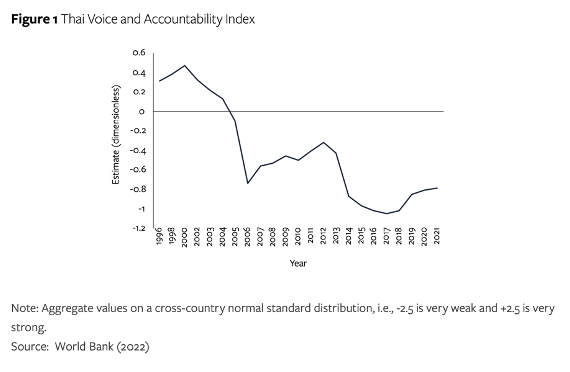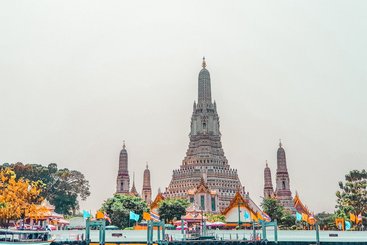Progressive power struggles and our ongoing work on Inclusive, Sustainable Economic Transformations (ISET)
The recent elections in Thailand brought a surprise victory for the progressive Move Forward Party, followed by a pushback by the conservative establishment that blocked their route to governing.
This situation has interesting parallels with our recent Thai case study on Inclusive, Sustainable Economic Transformation (ISET), which shows how conservative forces frustrate the implementation of transformational policies to rebalance power between economic, social and environmental goals. In Thailand’s politics, as in its public policy, the promise of progressive change has been stymied by the power of the status quo.
Over the last three years, with the support of Sida (The Swedish International Development Cooperation Agency), a team of diverse ODI researchers and country experts have been working on ISET; gathering evidence from different countries and sectors to better understand how to create links between social inclusion, ecological sustainability and economic transformation politics and policies. Thailand emerged, from our indicators analysis, as a leading example internationally, but our initial desk-based policy analysis looking for positive examples (working paper, journal article) revealed that, although Thailand’s policy-makers had adopted themes related to ISET, progress towards achieving these goals was slow.
In June, we published an update looking at the political economy changes necessary to set Thailand on the path to more sustainable and inclusive economic transformation. We write this insight in the hope that, even though it seems that conservative forces will largely maintain power for now, the surprising mandate for progressive political change in the recent elections provides an entry point for designing and – crucially – implementing the policies required for ISET.
Synthesising the detailed findings in the reports above, we focus on key areas of the political-economic system that have acted as barriers to progressive change and outline issues the incoming government could consider to accelerate the transition to a more just, prosperous, and ecologically sustainable economy.
The might of business and military elites hampered progress in sustainability and social inclusion
Through interviews with experts and thought leaders in Thai society and a review of recent policy changes, we explored why the inclusive and sustainable transformation promised in decades of central planning documents has not been realised. Directly mirroring the military-appointed senate’s revanchist parliamentary vote which blocked the election of the most popular and progressive Prime Minister candidate, Pita Limjareonrat, our findings suggest that key implementation barriers arise from a long-standing and mutually reinforcing elite power structure. In broad terms, the army has dominated politics, a handful of business tycoons have dominated the economy, and the monarchy has held sway over society and culture. Despite promises to the contrary, powerful political and economic actors have persistently obstructed progressive reform. The insulation from popular will generated by this de facto bargain between elite power groups and the crossovers between them (e.g. several Prime Ministerial candidates come from tycoon families) partly explains why socioeconomic equality and economic and environmental performance have worsened in recent years despite widespread proclamations that change would come. Two clear examples include the previous Prime Minister Prayut Cha-o-cha frustrating the passage of the citizen-driven Thai Clean Air Act, and the ineffective implementation of the 2017 Competition Law aimed at curbing the power of monopolies.
The election campaign breathed new life into chronically disempowered critical voices
Our research and interviews suggested that several underlying factors have contributed to the persistent power of these actors. Of particular note is the inability of citizens, NGOs, and critical voices in Thai society to effectively hold elites to account (Figure 1). Underlying factors for this inability include the military’s use of violence and the courts to threaten detractors, the judiciary mostly ruling in favour of conservative forces, and limited state funding for civil society organisations.

This is why, despite the frustration of the Move Forward Party and other progressive actors, we see aspects of the recent elections as part of a hopeful trend. For example, rather than influenced by patronage politics of old, campaigning was unusually diverse, featuring a range of opposition views across various media platforms, and the promise of progressive policies was key to garnering votes. Given the legal, political and violent means used to repress dissenting voices in previous political contests, it was also positive to see a largely peaceful campaign.
Fundamental reform is necessary to underpin inclusive, sustainable economic transformation
Much of the resistance to Move Forward arose from calls to reform the lese-majeste law that criminalises criticism of the royal family. However, looking beyond this, all six alliance parties also agreed to call for many other reforms that align with our findings, such as reducing the military’s power, breaking up economic monopolies and the decentralisation of budget decisions. That these parties campaigned on these issues and together collected a majority of the vote demonstrates a strong public mandate for progressive change rather than the type of change seen to date that has continued to serve elite interests.
Tackling monopoly power across Thai society is clearly required to create the type of economy needed to support more egalitarian prosperity, but it is also an issue that constrains existing government policies that seek to reshape the Thai economy. For example, the bioeconomy green (BCG) project is an ambitious attempt to accelerate technology adoption to transform a variety of sectors that either use more environmentally friendly inputs or that could contribute to reducing environmental pollution. Recognising a shift in international demand towards sustainable products, the BCG aligns well with some of our thinking on ISET issues and could generate substantial economic output from activities that respect environmental concerns. However, its implementation thus far has limited potential for social inclusion. Equally, unless it actively prioritises small and medium enterprises (SMEs) and tailors capacity-building and financial support to small-scale agricultural producers, the benefits will mainly be captured by the same big businesses that have dominated established economic sectors.
Diverse voices calling for change
Despite progressive parties failing to seize power, calls for fundamental reforms will be difficult to ignore when the incoming administration decides the government’s priorities for the coming years. An early signal may come from whether there are any actions that support decentralising budget decisions since, as one of our interviewees, noted: “The one who controls the fiscal budget is the one who can control the most power.”
Other conventional positions are also starting to shift. For example, small businesses are beginning to advocate for improved environmental policies on issues such as air pollution and drought. Regarding social inclusion, previously taboo subjects like same-sex marriage are now firmly on the table. Whether progressive actors can further their gains remains uncertain, the momentum created by their manifesto policies and successful election campaign, and the ensuing challenge to the country’s elites, have created space for more open discussions on Thai politics and the management of the economy. These developments suggest there may be opportunities to rebalance elite power and highlight the potential for Thailand to implement the more socially inclusive and ecologically sustainable economy that it will need if it is to meet the Sustainable Development Goals (SDGs) and domestic long-term ambitions.




